人教版七年级下册Unit 4 Don't eat in class. Section A (1a~2d)课件(共30张PPT)
文档属性
| 名称 | 人教版七年级下册Unit 4 Don't eat in class. Section A (1a~2d)课件(共30张PPT) | 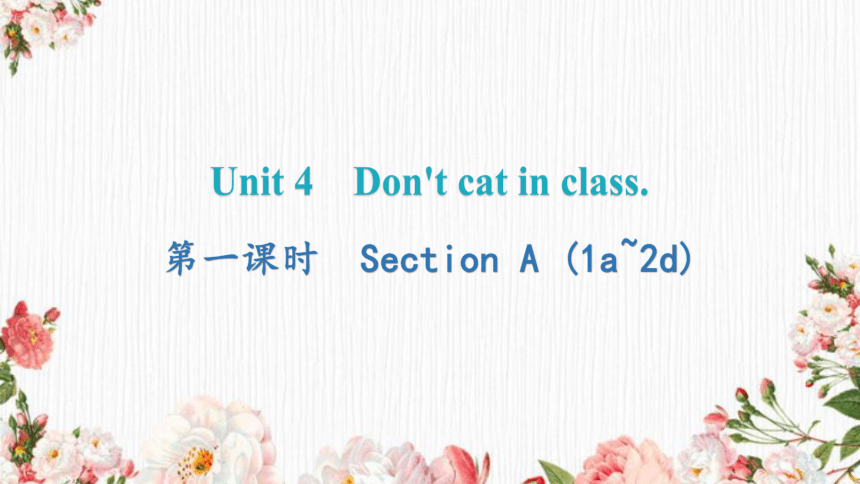 | |
| 格式 | pptx | ||
| 文件大小 | 402.2KB | ||
| 资源类型 | 教案 | ||
| 版本资源 | 人教新目标(Go for it)版 | ||
| 科目 | 英语 | ||
| 更新时间 | 2023-02-11 19:07:30 | ||
图片预览

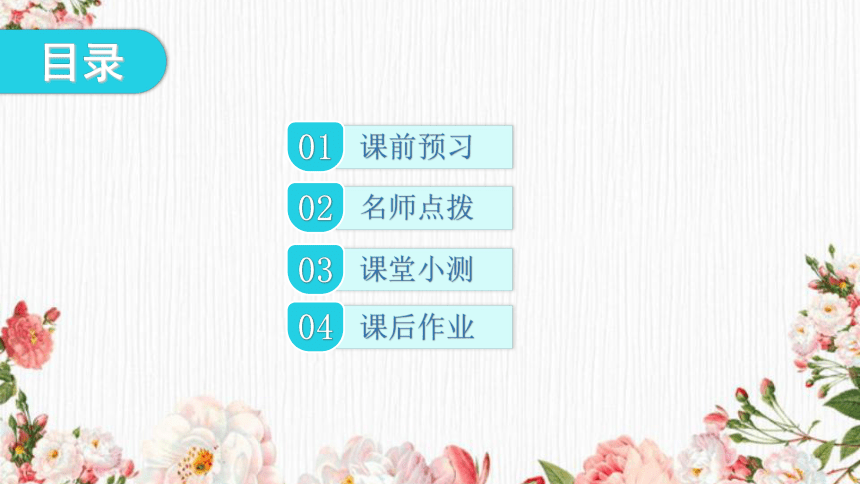
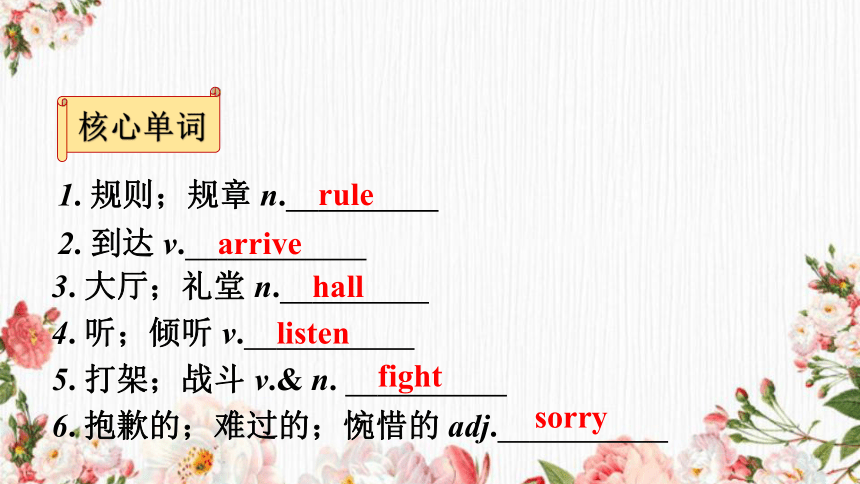
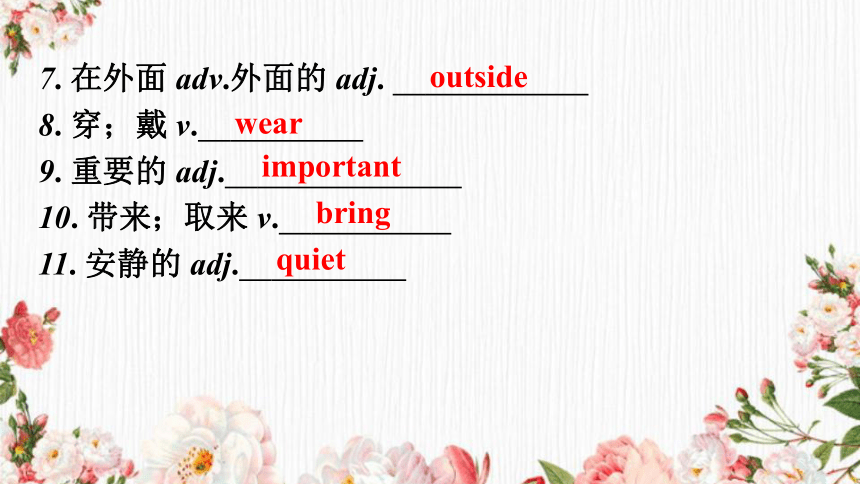
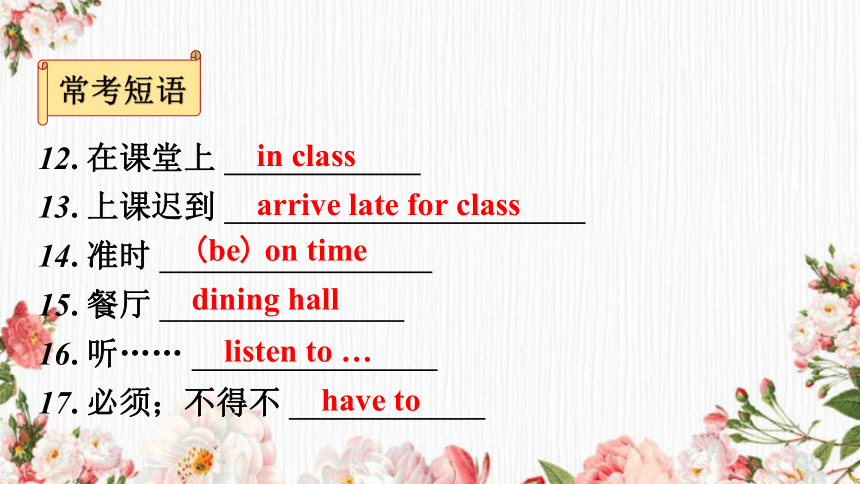
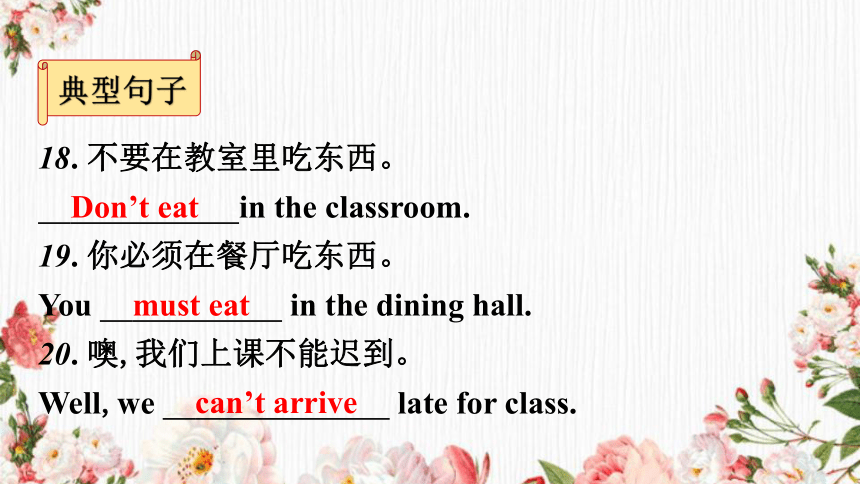

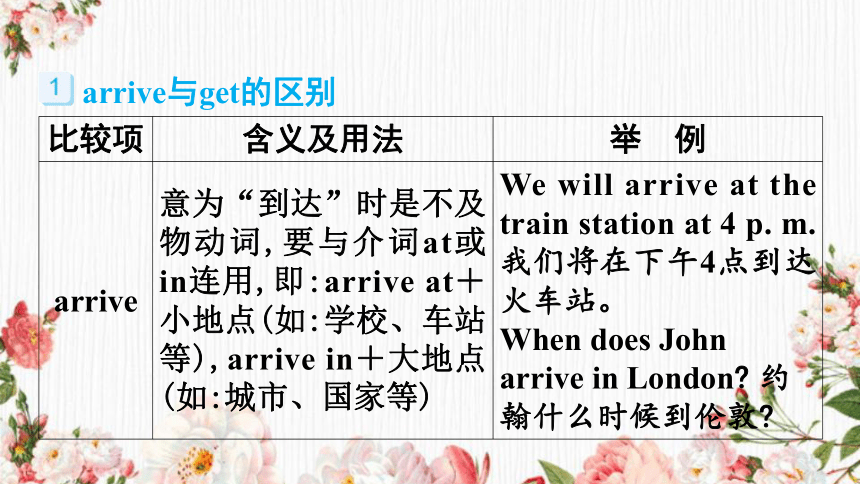
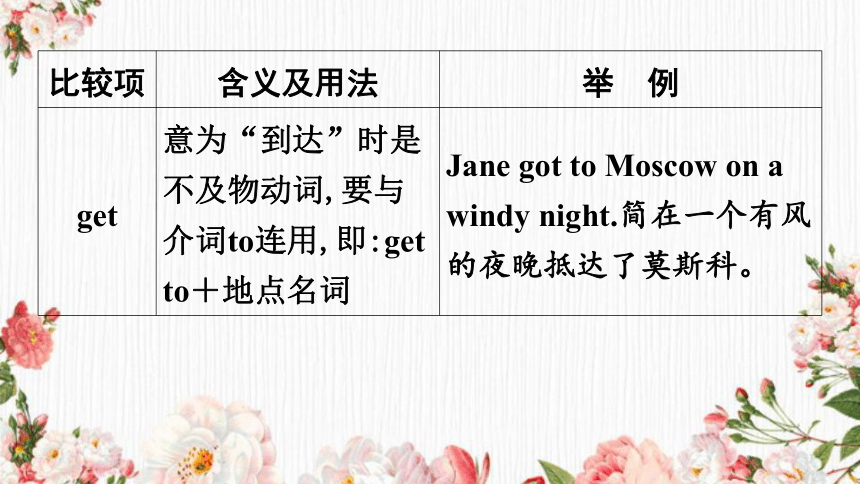
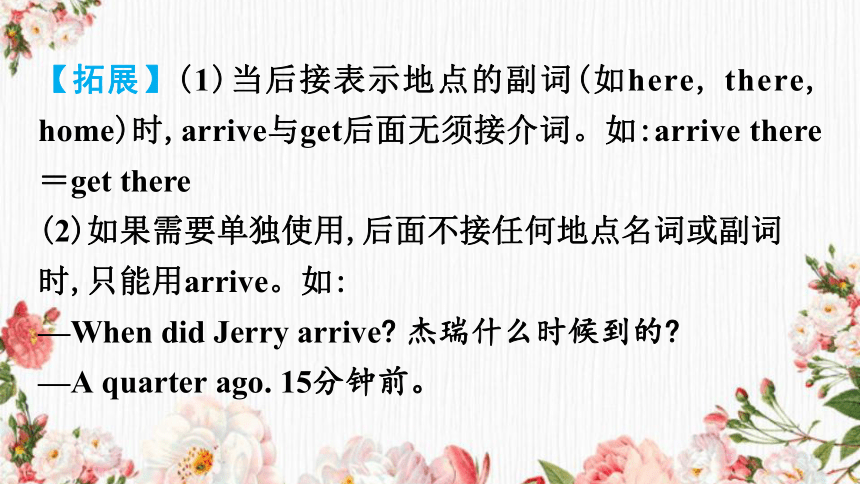
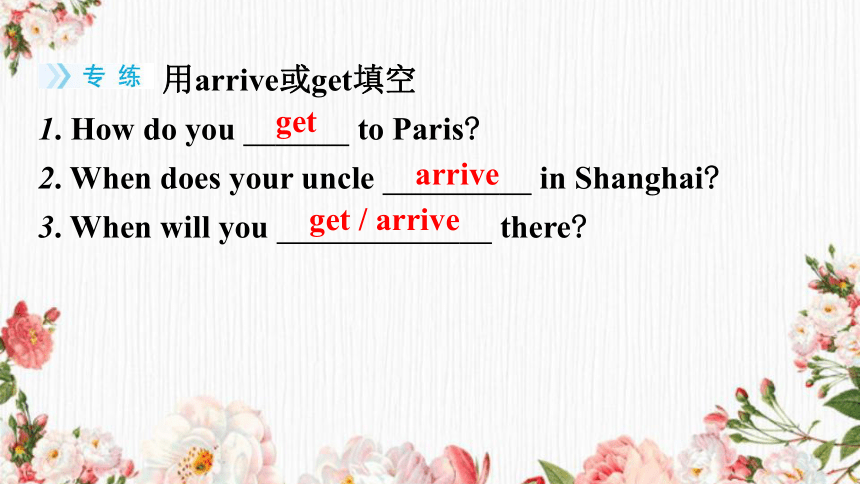
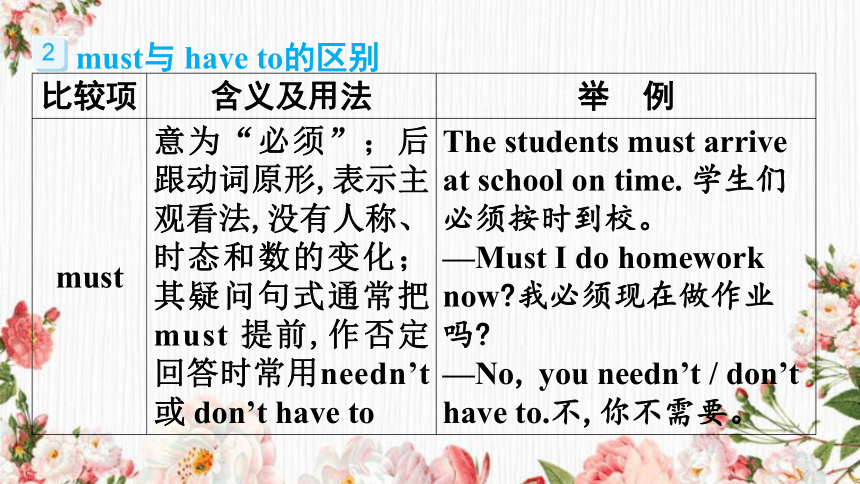
文档简介
(共30张PPT)
Unit 4 Don't cat in class.
第一课时 Section A (1a~2d)
目录
01
课前预习
02
名师点拨
03
课堂小测
04
课后作业
核心单词
1. 规则;规章 n. rule
2. 到达 v. arrive
rule
arrive
3. 大厅;礼堂 n. hall
4. 听;倾听 v. listen
5. 打架;战斗 v.& n. fight
6. 抱歉的;难过的;惋惜的 adj. sorry
hall
listen
fight
sorry
7. 在外面 adv.外面的 adj. outside
8. 穿;戴 v. wear
9. 重要的 adj. important
10. 带来;取来 v. bring
11. 安静的 adj. quiet
outside
wear
important
bring
quiet
常考短语
12. 在课堂上 in class
13. 上课迟到 arrive late for class
14. 准时 (be) on time
15. 餐厅 dining hall
16. 听…… listen to …
17. 必须;不得不 have to
in class
arrive late for class
(be) on time
dining hall
listen to …
have to
典型句子
18. 不要在教室里吃东西。
Don’t eat in the classroom.
19. 你必须在餐厅吃东西。
You must eat in the dining hall.
20. 噢,我们上课不能迟到。
Well,we can’t arrive late for class.
Don’t eat
must eat
can’t arrive
21. 这是我在学校的第一天。
It’s my first day at school.
22. 对的,所以我们必须守时。
OK,so we must be on time.
my first day
must be
arrive与get的区别
比较项 含义及用法 举 例
arrive 意为“到达”时是不及物动词,要与介词at或in连用,即:arrive at+小地点(如:学校、车站等),arrive in+大地点(如:城市、国家等) We will arrive at the train station at 4 p. m.我们将在下午4点到达火车站。
When does John arrive in London 约翰什么时候到伦敦
比较项 含义及用法 举 例
get 意为“到达”时是不及物动词,要与介词to连用,即:get to+地点名词 Jane got to Moscow on a windy night.简在一个有风的夜晚抵达了莫斯科。
【拓展】(1)当后接表示地点的副词(如here, there, home)时,arrive与get后面无须接介词。如:arrive there=get there
(2)如果需要单独使用,后面不接任何地点名词或副词时,只能用arrive。如:
—When did Jerry arrive 杰瑞什么时候到的
—A quarter ago. 15分钟前。
用arrive或get填空
1. How do you get to Paris
2. When does your uncle arrive in Shanghai
3. When will you get / arrive there
get
arrive
get / arrive
must与 have to的区别
比较项 含义及用法 举 例
must 意为“必须”;后跟动词原形,表示主观看法,没有人称、时态和数的变化;其疑问句式通常把must 提前,作否定回答时常用needn’t 或 don’t have to The students must arrive at school on time. 学生们必须按时到校。
—Must I do homework now 我必须现在做作业吗
—No, you needn’t / don’t have to.不,你不需要。
比较项 含义及用法 举 例
have to 意为“必须;不得不”;后跟动词原形,强调客观需要,有人称、时态和数的变化;其疑问句式或否定句式需要借助助动词do或情态动词will Kate’s parents aren’t at home. She has to look after her little brother. 凯特的父母不在家。她不得不照看她的弟弟。
Do you have to clean your bedroom every day 你必须每天打扫你的卧室吗
( B )1.His bike is broken, so he walk home.
A. must B. has to C. have to
( C )2. It is very warm. You wear the coat.
A. must B. mustn’t C. don’t have to
B
C
listen的用法
listen意为“听;倾听”,是不及物动词,强调“听”的动作,可单独使用;后接宾语时,常与介词to连用,即“listen to+名词或代词”,表示有目的、有意识地听。如:
Listen! Someone is singing in the music room. 听!有人在音乐室里唱歌。
Kate likes listening to music after class. 下课后,凯特喜欢听音乐。
( B )1. The little boy doesn’t music at all.
A. listen B. listen to C. listens to
2. 课堂上我们必须认真听老师讲课。(根据汉语意思完成句子,词数不限)
We must listen to the teacher carefully in class.
B
listen to
fight 的用法
Don’t fight with Jim. 不要与吉姆打架。
They are fighting for freedom. 他们在为自由而战。
We must fight against the enemy. 我们必须与敌人做斗争。
( A )1. My mom tells me it is not right to fight my classmates at school.
A. with B. to C. for
2. 戴维是一个好孩子。他从不打架。(根据汉语意思完成句子,词数不限)
David is a good child. He never fights .
A
never fights
bring, take与get的区别
比较项 含义及用法 举 例
bring 意为“带来;取来”,指从别处将某人或某物带到说话人所在的地方 Remember to bring your book to me. 记得把你的书带来给我。
比较项 含义及用法 举 例
take 意为“带走;拿走”,指把某人或某物从说话人所在地带走 It’s going to rain. You’d better take an umbrella with you. 要下雨了。你最好带上一把雨伞。
比较项 含义及用法 举 例
get 意为“带来;去取;去拿”,指到某处把某人或某物带来(双程) There is no water in the bottle. Why not get some 瓶子里没有水了。为什么不去取一些呢
( C )1. Please a cup of tea to me. I’m thirsty.
A. take B. carry
C. bring D. drink
( D )2. —It is very cold outside. Remember to a coat when you go out. —OK, Mom.
A. put B. bring C. get D. take
C
D
一、根据句意及中文或首字母提示,用单词的适当形式填空
1. Mr.Jones has many rules (规则) in his sports club.
2. Usually Ms.Clark arrives (到达) at school very early.
3. At school Simon never fights with his classmates.
rules
arrives
ights
4. I’m sorry (抱歉的) I can’t help you with your math.
5. Listen to me! We don’t have much time.
sorry
isten
二、根据要求完成句子,每空一词
6. We can watch TV before dinner. (就画线部分提问)
When can you watch TV
7. You can’t go out on school nights.(改为祈使句)
Don’t go out on school nights.
When
can
Don’t
go
8. David has to do his homework first after school.(改为一般疑问句,并作否定回答)
— Does David have to do his homework first after school
— No , he doesn’t .
9. I have to do my homework every day. (就画线部分提问)
What do you have to do every day
Does
have
to
No
he
doesn’t
What
do
do
10. He has to clean his room every day.(改为否定句)
He doesn’t have to clean his room every day.
doesn’t
have
to
三、单项填空
( A )11. —Must we take out the trash (倒垃圾)now
— .You can do it after class.
A. No, you needn’t B. No, you can’t
C. Yes, you must
( C )12. Tom likes singing and he often music before going to bed.
A. listen to B. listens C. listens to
A
C
( C )13. Does he have to home now
A. going B. goes C. go
( C )14. We at school at 7:00 every day.
A. get B. go C. arrive D. come
( B )15. All of us think it’s to get to school on time.
A. interesting B. important
C. funny D. boring
C
C
B
请同学们完成Unit 4第一课时的练习题。
Unit 4 Don't cat in class.
第一课时 Section A (1a~2d)
目录
01
课前预习
02
名师点拨
03
课堂小测
04
课后作业
核心单词
1. 规则;规章 n. rule
2. 到达 v. arrive
rule
arrive
3. 大厅;礼堂 n. hall
4. 听;倾听 v. listen
5. 打架;战斗 v.& n. fight
6. 抱歉的;难过的;惋惜的 adj. sorry
hall
listen
fight
sorry
7. 在外面 adv.外面的 adj. outside
8. 穿;戴 v. wear
9. 重要的 adj. important
10. 带来;取来 v. bring
11. 安静的 adj. quiet
outside
wear
important
bring
quiet
常考短语
12. 在课堂上 in class
13. 上课迟到 arrive late for class
14. 准时 (be) on time
15. 餐厅 dining hall
16. 听…… listen to …
17. 必须;不得不 have to
in class
arrive late for class
(be) on time
dining hall
listen to …
have to
典型句子
18. 不要在教室里吃东西。
Don’t eat in the classroom.
19. 你必须在餐厅吃东西。
You must eat in the dining hall.
20. 噢,我们上课不能迟到。
Well,we can’t arrive late for class.
Don’t eat
must eat
can’t arrive
21. 这是我在学校的第一天。
It’s my first day at school.
22. 对的,所以我们必须守时。
OK,so we must be on time.
my first day
must be
arrive与get的区别
比较项 含义及用法 举 例
arrive 意为“到达”时是不及物动词,要与介词at或in连用,即:arrive at+小地点(如:学校、车站等),arrive in+大地点(如:城市、国家等) We will arrive at the train station at 4 p. m.我们将在下午4点到达火车站。
When does John arrive in London 约翰什么时候到伦敦
比较项 含义及用法 举 例
get 意为“到达”时是不及物动词,要与介词to连用,即:get to+地点名词 Jane got to Moscow on a windy night.简在一个有风的夜晚抵达了莫斯科。
【拓展】(1)当后接表示地点的副词(如here, there, home)时,arrive与get后面无须接介词。如:arrive there=get there
(2)如果需要单独使用,后面不接任何地点名词或副词时,只能用arrive。如:
—When did Jerry arrive 杰瑞什么时候到的
—A quarter ago. 15分钟前。
用arrive或get填空
1. How do you get to Paris
2. When does your uncle arrive in Shanghai
3. When will you get / arrive there
get
arrive
get / arrive
must与 have to的区别
比较项 含义及用法 举 例
must 意为“必须”;后跟动词原形,表示主观看法,没有人称、时态和数的变化;其疑问句式通常把must 提前,作否定回答时常用needn’t 或 don’t have to The students must arrive at school on time. 学生们必须按时到校。
—Must I do homework now 我必须现在做作业吗
—No, you needn’t / don’t have to.不,你不需要。
比较项 含义及用法 举 例
have to 意为“必须;不得不”;后跟动词原形,强调客观需要,有人称、时态和数的变化;其疑问句式或否定句式需要借助助动词do或情态动词will Kate’s parents aren’t at home. She has to look after her little brother. 凯特的父母不在家。她不得不照看她的弟弟。
Do you have to clean your bedroom every day 你必须每天打扫你的卧室吗
( B )1.His bike is broken, so he walk home.
A. must B. has to C. have to
( C )2. It is very warm. You wear the coat.
A. must B. mustn’t C. don’t have to
B
C
listen的用法
listen意为“听;倾听”,是不及物动词,强调“听”的动作,可单独使用;后接宾语时,常与介词to连用,即“listen to+名词或代词”,表示有目的、有意识地听。如:
Listen! Someone is singing in the music room. 听!有人在音乐室里唱歌。
Kate likes listening to music after class. 下课后,凯特喜欢听音乐。
( B )1. The little boy doesn’t music at all.
A. listen B. listen to C. listens to
2. 课堂上我们必须认真听老师讲课。(根据汉语意思完成句子,词数不限)
We must listen to the teacher carefully in class.
B
listen to
fight 的用法
Don’t fight with Jim. 不要与吉姆打架。
They are fighting for freedom. 他们在为自由而战。
We must fight against the enemy. 我们必须与敌人做斗争。
( A )1. My mom tells me it is not right to fight my classmates at school.
A. with B. to C. for
2. 戴维是一个好孩子。他从不打架。(根据汉语意思完成句子,词数不限)
David is a good child. He never fights .
A
never fights
bring, take与get的区别
比较项 含义及用法 举 例
bring 意为“带来;取来”,指从别处将某人或某物带到说话人所在的地方 Remember to bring your book to me. 记得把你的书带来给我。
比较项 含义及用法 举 例
take 意为“带走;拿走”,指把某人或某物从说话人所在地带走 It’s going to rain. You’d better take an umbrella with you. 要下雨了。你最好带上一把雨伞。
比较项 含义及用法 举 例
get 意为“带来;去取;去拿”,指到某处把某人或某物带来(双程) There is no water in the bottle. Why not get some 瓶子里没有水了。为什么不去取一些呢
( C )1. Please a cup of tea to me. I’m thirsty.
A. take B. carry
C. bring D. drink
( D )2. —It is very cold outside. Remember to a coat when you go out. —OK, Mom.
A. put B. bring C. get D. take
C
D
一、根据句意及中文或首字母提示,用单词的适当形式填空
1. Mr.Jones has many rules (规则) in his sports club.
2. Usually Ms.Clark arrives (到达) at school very early.
3. At school Simon never fights with his classmates.
rules
arrives
ights
4. I’m sorry (抱歉的) I can’t help you with your math.
5. Listen to me! We don’t have much time.
sorry
isten
二、根据要求完成句子,每空一词
6. We can watch TV before dinner. (就画线部分提问)
When can you watch TV
7. You can’t go out on school nights.(改为祈使句)
Don’t go out on school nights.
When
can
Don’t
go
8. David has to do his homework first after school.(改为一般疑问句,并作否定回答)
— Does David have to do his homework first after school
— No , he doesn’t .
9. I have to do my homework every day. (就画线部分提问)
What do you have to do every day
Does
have
to
No
he
doesn’t
What
do
do
10. He has to clean his room every day.(改为否定句)
He doesn’t have to clean his room every day.
doesn’t
have
to
三、单项填空
( A )11. —Must we take out the trash (倒垃圾)now
— .You can do it after class.
A. No, you needn’t B. No, you can’t
C. Yes, you must
( C )12. Tom likes singing and he often music before going to bed.
A. listen to B. listens C. listens to
A
C
( C )13. Does he have to home now
A. going B. goes C. go
( C )14. We at school at 7:00 every day.
A. get B. go C. arrive D. come
( B )15. All of us think it’s to get to school on time.
A. interesting B. important
C. funny D. boring
C
C
B
请同学们完成Unit 4第一课时的练习题。
同课章节目录
- Unit 1 Can you play the guitar?
- Section A
- Section B
- Unit 2 What time do you go to school?
- Section A
- Section B
- Unit 3 How do you get to school?
- Section A
- Section B
- Unit 4 Don't eat in class.
- Section A
- Section B
- Unit 5 Why do you like pandas?
- Section A
- Section B
- Unit 6 I'm watching TV.
- Section A
- Section B
- Review of Units 1-6
- Unit 7 It's raining!
- Section A
- Section B
- Unit 8 Is there a post office near here?
- Section A
- Section B
- Unit 9 What does he look like?
- Section A
- Section B
- Unit 10 I'd like some noodles.
- Section A
- Section B
- Unit 11 How was your school trip?
- Section A
- Section B
- Unit 12 What did you do last weekend?
- Section A
- Section B
